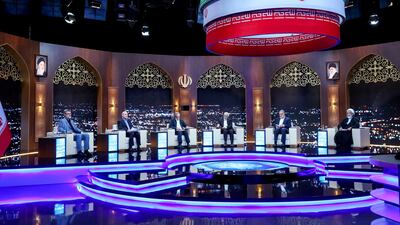Iran’s six presidential candidates spoke about ways to solve the country's economic issues in a four-hour televised debate ahead of the June 28 election to pick a new leader.
The country is set to choose a new head following a helicopter crash last month that killed President Ebrahim Raisi and other officials.
The debate on Monday was the first of five planned for the next 10 days, before Iranians head to the polls amid heightened regional tension and political and economic issues, worsened by US sanctions.
Without much time to prepare their campaigns, the candidates put forward plans to cope with international sanctions, promising to introduce to reforms and fight corruption – without providing any tangible detail.
The June 28 vote also comes against the backdrop of increasing pressure on Iran over its nuclear programme, crackdown on opposition and support for regional proxy groups.
Five of the candidates are hardliners and one is a reformist.
All are vying to replace Mr Raisi, a hardliner and a favourite of supreme leader Ayatollah Ali Khamenei. Mr Raisi has been seen as a successor to the cleric.
Mohammad Baqer Qalibaf

Iran's Parliament Speaker Mohammad Baqer Qalibaf, 62, is the most prominent candidate.
A former mayor of Tehran and commander of the Islamic Revolutionary Guard Corps, he promised that the removal of sanctions through diplomatic efforts would be his top priority.
He also vowed to be a supporter of the poor and to ensure economic growth by managing the economy efficiently and tackling inflation.
Mr Qalibaf said that with “strong management” and “a strong president,” inflation could be brought under control, according to state-run Irna news agency.
Mr Qalibaf, 62, has run unsuccessfully in previous presidential elections. In 2017, he pulled out of the contest to avoid splitting the vote against Mr Raisi.
He is part of a circle of conservatives appointed and promoted by the supreme leader.
Amirhossein Ghazizadeh Hashemi

Currently Iran's Vice President, Amirhossein Ghazizadeh Hashemi stood in the 2021 presidential election, finishing fourth.
Mr Ghazizadeh Hashemi, 53, used the debate as an opportunity to showcase the achievements of the government under Mr Raisi, which he was a part of.
“People are fed up with promises,” he said, adding that the president should introduce economics roadmaps and how they are intended to be carried out to the people.
Alireza Zakani

Hardliner and current Mayor of Tehran, Alireza Zakani, 58, said that while US and Western sanctions were crippling the economy, the country's currency – the rial – needed to be strengthened.
He argued that economic independence needs to be achieved by stabilising the economy and ensuring that Iranians rely on the national currency.
“If we want people to stand for the revolution, we must make the people participate in the economy,” Mr Zakani said, adding that the private sector should be at the helm of the economy and stressing the importance of the participation of the population.
Saeed Jalili

A member of the Supreme National Security Council and a former nuclear negotiator, Saeed Jalili, 58, touched upon the importance of investment in achieving economic growth.
He also highlighted the importance of the government allocating resources for “national talent” and that investing in people will ultimately improve the economy.
Despite his experience with nuclear negotiations, Mr Jalili – like the other candidates – did not touch upon the issue.
Mostafa Pourmohammadi

Mr Pourmohammadi, 64, has served in different ministerial positions – the most recent one being justice minister in 2013.
He also served as prosecutor of the revolutionary court.
He said work needed to be put into “national reconciliation” to gain people's trust and that economic issues should not be separated from social ones.
He added that sanctions were obstructing international trade, stating that Iran's ties to other countries were “locked.”
Masoud Pezeshkian

Masoud Pezeshkian, 69, is the only reformist in the race but it remains to be seen whether he can gain the support of undecided voters.
He called for more openness towards other countries to achieve economic growth.
He remains the favourite of pro-reformists and critics say conservatives may seek to discredit him.
Prominent disqualified figures include former president Mahmoud Ahmadinejad and veteran politician Ali Larijani, who were both previously barred from the 2021 election.
Several members of former president Hassan Rouhani’s administration, including his vice president Eshagh Jahangiri, also had their candidacy rejected by the Guardian Council.
All six candidates promised a better economic outlook for the country without offering any specifics on how this would be achieved.
Four more debates will take place, with the last one set for June 25 – three days before Iranians head to the polls.


